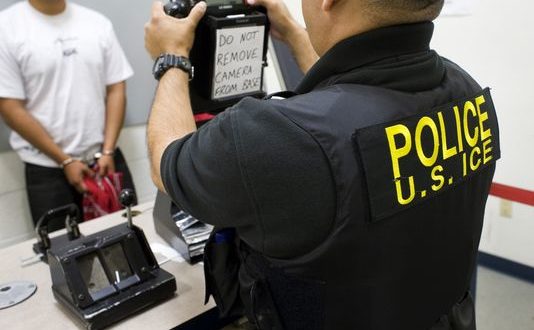Why we can't take it easy on immigrant felons
Published on May 19th, 2014
Mark H. Metcalf
May 17, 2014
AZ Central
A case working its way to the U.S. Supreme Court, Lopez-Valenzuela vs. Maricopa County, pits the American Civil Liberties Union against Arizona and its mandatory detention of accused felons who are also illegally present in the U.S. This practice, the ACLU claims, is unconstitutional.
The requirement is intended to prevent flight from prosecution and makes it more likely offenders will stand trial and, if convicted, will eventually be deported. The law approved by voters in 2006 reflects a now standard frustration with broken federal promises to secure borders and enforce removal orders.
The ACLU argues that these offenders pose no greater flight risks than other groups. “It’s unfair,” it urged the 9th U.S. Circuit Court of Appeals, “to subject (illegal immigrants) to rules that don’t apply to everyone else.”
Some fact checking is needed.
Immigrant offenders, in fact, often fail to follow the rules — that is, attend court like everyone else. Immigration Court records from 1996 through 2012 show that 76 percent of 1.1 million deportation orders were issued against those who, while permitted to remain free pending trial, chose to evade court. Evasions, it turns out, are the greatest source of unexecuted removal orders in the Immigration Court system.
By contrast, those detained pending trial produced wholly different results. Over the same 16-year period, Immigration Courts handed down 2.7 million removal orders — 60 percent of them or 1.6 million — in detention facilities. While up to 96 percent of these removal orders, records say, are executed, the non-detained continue to avoid court.
Fugitives from deportation orders totaled 558,000 in 2008. Today, their numbers stand at 840,000 — a 51 percent increase in less than six years — and lend weight to Arizona’s practical remedy. History, remote and recent, sheds light on the state’s predicament.
A 1989 General Accountability Office report found that “aliens have nothing to lose by failing to appear for hearings and … ignoring the deportation process” because few were ever deported. The Department of Homeland Security in 2006 made the same findings with nearly the same facts. Court evasion, it said, is significant and removal orders go unenforced.
THE CONSEQUENCES OF GOING EASY
Failure to enforce the most elevating and redemptive cornerstone of federal law — the Immigration and Nationality Act — invites more than porous borders, feeble courts and frail enforcement. Relief for the deserving is inexcusably delayed (350,000 cases are now backlogged) and law-abiding neighborhoods are carelessly jeopardized. Last year, about 68,000 criminal aliens were put back on the street instead of being removed. Amid this federal retreat, security challenges persist and the high price of non-enforcement goes up.
The DHS reported in 2006 that 85 percent of detainees from nations that aid and sponsor terrorism vanished when freed from detention. Moroccan-born El Mehdi Fathi is a variation on this theme, one that our approach to enforcement enables.
Overstaying his student visa after flunking college in 2009, Fathi disappeared, but he was eventually arrested on Virginia criminal charges and, despite immigration violations, was released. By 2012, he turned up in a California jail for theft. Facing deportation, he shammed a persecution claim and avoided removal. He promptly went east and plotted attacks on a Connecticut federal building until his April 2014 arrest.
Common criminals threaten, too. Santana Goana, a Mexican national and FBI informant in federal custody linked to rape, was released before trial by Immigration and Customs Enforcement, only to murder a 33-year-old father on Oct. 22, 2011, in Dallas.
These troubling trends and tragedies can neither dim the positive impact immigration plays in our national life nor heighten the imperatives that demand fixes. They simply show how far we have fallen in our failure to dignify the many who play by the rules by refusing to sanction those who do not and, in doing so, foster more of the same problems that got us where we are today.
LEGAL IMMIGRATION’S BENEFITS
America’s generous immigration policies prove us a nation welcoming without precedent. The U.S. accepts more lawful permanent residents and new citizens each year than all the world combined. More than 80 million newcomers have embraced our shores since 1820. With them came the settling of a continent, the end of slavery (nearly a quarter of the Union Army was foreign-born) and the seeds of a workforce that helped make us an economic giant.
Our wealth adds up in more profound ways, too. Twenty percent of America’s Medal of Honor recipients — 716 out of 3,468 — are not native sons, but those we adopted. Moreover, they adopted us.
Immigration successes past and present provide the surest template for the future, and in the dysfunction that now tarnishes our commitment to the foreign-born, a lesson emerges. The nation that can elevate the immigrant must likewise sanction those who violate. Arizona’s measure is evidence that half of this lesson is lost on a federal government that panders rather than protects the great national institution entrusted to its care.
Immigration done right — by attracting the talented, redeeming the persecuted and removing the offender — dignifies and enriches us all. The systemic disorder America now faces does neither.
Mark H. Metcalf held several positions at the Justice and Defense departments under President George W. Bush, including judge on the Immigration Court in Miami. He is Garrard County attorney in Lancaster, Ky.





